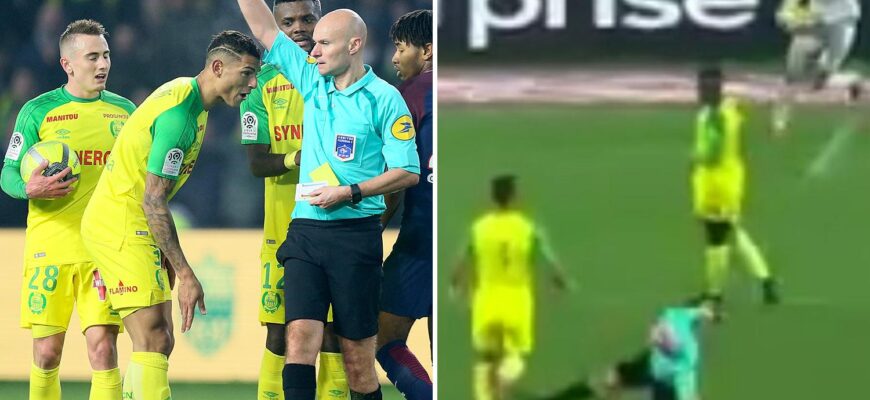In the dynamic world of football, where passion and precision collide, the role of the referee is often thankless, yet crucial. Recently, the spotlight has swung sharply onto officiating in France`s top tier, Ligue 1, igniting a heated debate that questions the very rhythm and enjoyment of the game. The core contention? A perceived over-eagerness in issuing red cards and a penchant for constant whistle-blowing that, critics argue, is breaking the game`s spirit and flow.
The Voice of Frustration: Daniel Riolo`s Critique
The epicentre of this discussion can be traced to Daniel Riolo, a prominent editorialist for RMC Sport. His recent commentary, following a particularly disrupted Lille-Lyon match, articulated a widespread frustration. Riolo`s exasperation is palpable: he`s “tired of French refereeing,” specifically decrying the rapidity with which red cards are brandished and the incessant fouls that interrupt the natural momentum of play.
According to Riolo, this officiating style doesn`t merely break the game`s rhythm; it inadvertently benefits defensive teams. When the flow is constantly fractured, attacking sides struggle to build coherence, while those seeking to nullify threats find ample opportunity for tactical resets. His argument transcends a simple grievance about individual decisions; it`s a systemic critique. “Don`t talk to me about rules,” he asserts, implying that while foundational regulations exist, their application requires adaptability and pragmatism – qualities he finds sorely lacking.
The “Spirit of the Game” vs. The “Letter of the Law”
Riolo`s critique touches upon a perennial philosophical debate in sports: should referees strictly adhere to the “letter of the law,” or should they interpret rules with the “spirit of the game” in mind? He suggests that current French refereeing leans heavily towards a rigid, almost bureaucratic application of rules. This, he postulates, might stem from directives issued from “offices” rather than fostering on-field judgment that prioritises fluid play.
This perspective posits that football isn`t merely a series of discrete incidents to be judged in isolation. It`s a continuous narrative, an evolving drama where slight contact doesn`t always warrant an immediate halt. An overly prescriptive approach, he suggests, strips the game of its organic unpredictability and replaces it with a predictable sequence of whistles and stoppages, turning potential masterpieces into fragmented mosaics.
Impact on the Spectacle: When Flow Becomes Frazzled
The direct consequence of frequent interruptions is a diminished spectacle. For fans, the joy of football often lies in sustained passages of play, intricate build-ups, and the ebb and flow of attacking and defending. When a match is continually stopped for minor infringements or perceived infractions, the tension deflates, the atmosphere sours, and the entertainment value plummets. It`s akin to watching a film where every few minutes, the projectionist pauses the movie for a minor adjustment – irritating and disruptive.
Players, too, are affected. Building rhythm, anticipating movements, and executing complex strategies become incredibly challenging when the game`s pulse is erratic. This can lead to frustration, more rash challenges, and a general sense of unease that permeates the pitch, potentially leading to the very situations that trigger these controversial red cards in the first place.
The Referee`s Unenviable Position: Following Orders?
Riolo`s assertion that referees “impose sanctions, apply what they are told” offers a glimpse into the pressures officiating bodies face. While it avoids direct personal attacks on individual referees, it subtly shifts the blame to the system. Are referees genuinely encouraged to be strict to a fault? Are they under undue pressure to demonstrate control through immediate punitive action?
It`s a delicate balance. Referees must maintain order, ensure fair play, and protect players. Yet, they are also entrusted with facilitating a captivating contest. If the directive from the top is to err on the side of caution and strict enforcement, then the resulting fragmented play might be an unavoidable, albeit lamentable, outcome of policy rather than individual error.
A Call for Dialogue and a Different “Spirit”
The solution, Riolo implies, isn`t to simply castigate officials but to initiate a profound discussion about the desired approach to refereeing. He provocatively challenged Laurent Landreau, a former goalkeeper now a sports consultant and spokesperson for the arbitration department, asking if this current style truly represents the “right way to arbitrate.” This isn`t a demand for anarchic play but a plea for a different “spirit” – one where officials are empowered to allow play to continue through minor contacts, reserving the harshest sanctions for genuinely malicious or game-altering fouls.
The ultimate goal, surely, is a game that is both fair and engaging. If French football`s authorities heed these calls for reflection, the outcome could be a Ligue 1 where the drama unfolds with fewer interruptions, where talent can truly shine, and where the beautiful game is allowed to flow, unencumbered by an overly zealous whistle or a quick draw for the red card.









